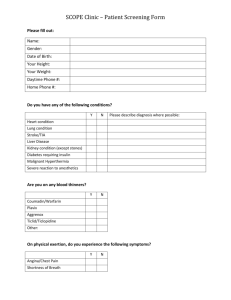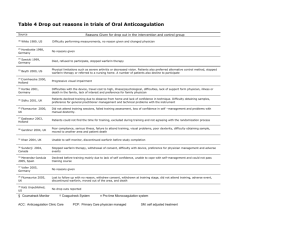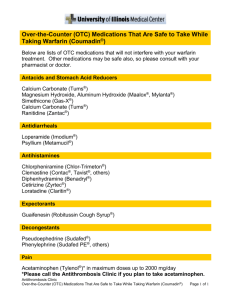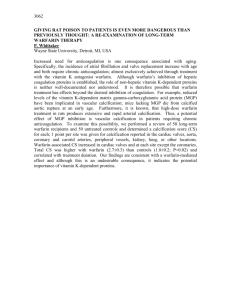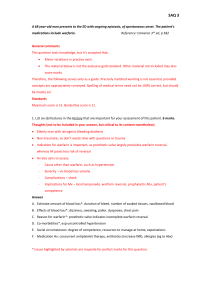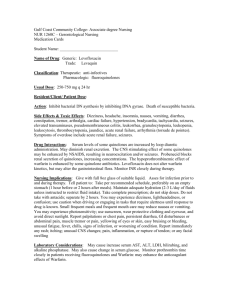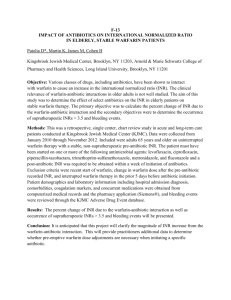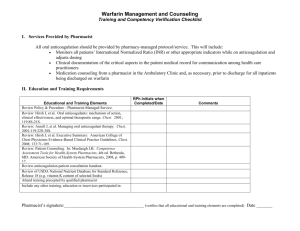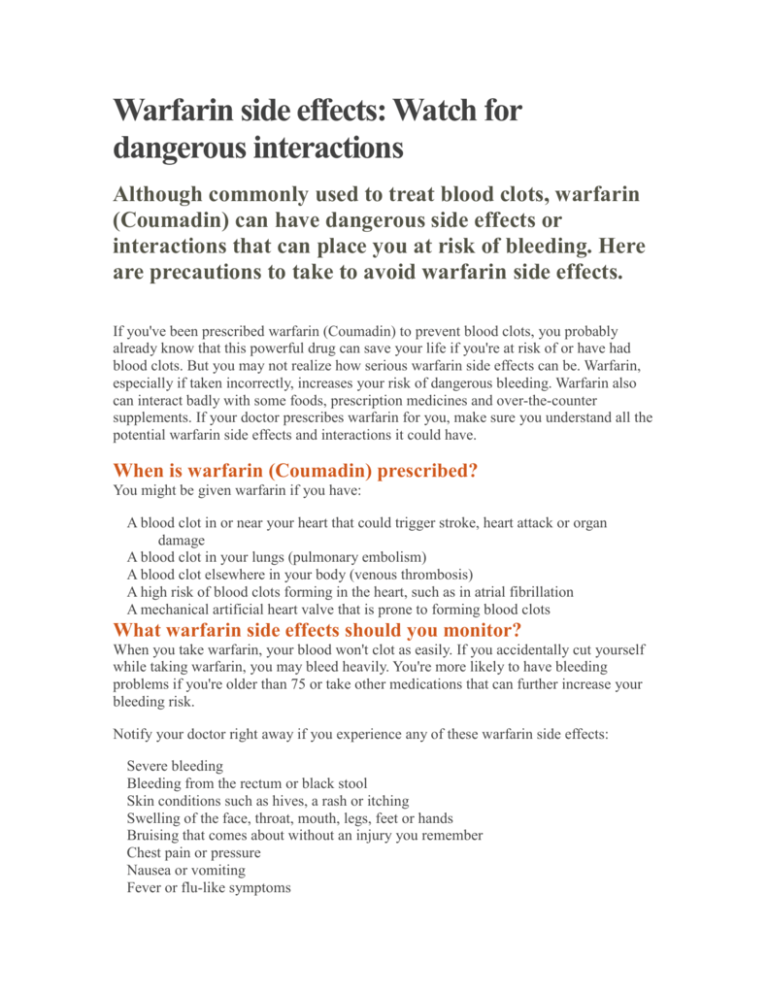
Warfarin side effects: Watch for
dangerous interactions
Although commonly used to treat blood clots, warfarin
(Coumadin) can have dangerous side effects or
interactions that can place you at risk of bleeding. Here
are precautions to take to avoid warfarin side effects.
If you've been prescribed warfarin (Coumadin) to prevent blood clots, you probably
already know that this powerful drug can save your life if you're at risk of or have had
blood clots. But you may not realize how serious warfarin side effects can be. Warfarin,
especially if taken incorrectly, increases your risk of dangerous bleeding. Warfarin also
can interact badly with some foods, prescription medicines and over-the-counter
supplements. If your doctor prescribes warfarin for you, make sure you understand all the
potential warfarin side effects and interactions it could have.
When is warfarin (Coumadin) prescribed?
You might be given warfarin if you have:
A blood clot in or near your heart that could trigger stroke, heart attack or organ
damage
A blood clot in your lungs (pulmonary embolism)
A blood clot elsewhere in your body (venous thrombosis)
A high risk of blood clots forming in the heart, such as in atrial fibrillation
A mechanical artificial heart valve that is prone to forming blood clots
What warfarin side effects should you monitor?
When you take warfarin, your blood won't clot as easily. If you accidentally cut yourself
while taking warfarin, you may bleed heavily. You're more likely to have bleeding
problems if you're older than 75 or take other medications that can further increase your
bleeding risk.
Notify your doctor right away if you experience any of these warfarin side effects:
Severe bleeding
Bleeding from the rectum or black stool
Skin conditions such as hives, a rash or itching
Swelling of the face, throat, mouth, legs, feet or hands
Bruising that comes about without an injury you remember
Chest pain or pressure
Nausea or vomiting
Fever or flu-like symptoms
Joint or muscle aches
Diarrhea
Difficulty moving
Numbness of tingling in any part of your body
Painful erection lasting four hours or longer
Other less serious warfarin side effects that you should tell your doctor about include:
Gas
Feeling cold
Fatigue
Pale skin
Changes in the way foods taste
Hair loss
Although rare, warfarin can also cause skin tissue death (necrosis) and gangrene
requiring amputation. This complication most often happens three to eight days after you
start taking warfarin. If you notice any sores, changes in skin color or temperature, or
severe pain on your skin, notify your doctor immediately.
What precautions can you take against warfarin side effects?
There are some key steps you can take to reduce your chance of developing warfarin side
effects. These include:
Tell your doctor about any other medications or supplements you take. Some
medications and supplements can have a dangerous interaction with warfarin.
Tell your health care provider you take warfarin before you have any medical or
dental procedures. These procedures include vaccinations and routine dental
cleanings. If you're going to have surgery, discuss what dosing changes might be
necessary at least 10 days before the procedure. Your doctor may decrease your
dose of warfarin or discontinue warfarin altogether before the procedure.
Avoid situations that increase your risk of injury. Things to avoid include contact
sports or activities that could result in head injury. Make sure you tell your doctor
if you are unsteady while walking or have a history of falling.
Consider wearing a bracelet or carrying a card that identifies that you take
warfarin. This can be useful if emergency medical personnel need to know what
medications you take.
Consider a warfarin sensitivity test. About a third of the people who take warfarin
are at a higher risk of bleeding because their genes make them more sensitive to
warfarin. If you're worried that you might be more sensitive to warfarin because a
family member experienced side effects, talk to your doctor about taking a
warfarin sensitivity test. The test can tell if you have the genes that can increase
your risk of bleeding.
What drugs and supplements can interact with warfarin?
Warfarin, like any other medication, can interact with foods, other drugs, vitamins or
herbal supplements. Be ready to provide your doctor with a complete list of everything
you're taking.
Drugs that can interact with warfarin include:
Aspirin or aspirin-containing products
Ibuprofen (Advil, Motrin, others) or naproxen (Aleve)
Tylenol or acetaminophen-containing products, especially when the dose of
acetaminophen exceeds 1,500 milligrams a day
Many antibiotics
Heparin
Cold or allergy medicines
Birth control pills
Medications that treat abnormal heart rhythms, such as amiodarone
This isn't a complete list. Many other medications interact with warfarin. You should
always consider that a new medication could interact with warfarin until your doctor,
nurse, or pharmacist tells you otherwise.
Supplements that can interact with warfarin include:
Fish oil and omega-3 supplements
Vitamin K
Bromelains
Coenzyme Q10 (ubidecarenone)
Cranberry extracts
Danshen
Dong quai
Garlic
Ginkgo
Ginseng
St. John's wort
What foods might interact with warfarin?
If you sometimes eat foods with a lot of vitamin K — such as soybean and canola oils,
spinach or broccoli — tell your doctor. Vitamin K can affect how your blood clots and
how warfarin protects you.
Garlic and licorice also may interact with warfarin, so talk to your doctor if you eat a lot
of these foods.
Consumption of cranberries or cranberry juice can affect the way warfarin works and can
increase your risk of bleeding. While an occasional glass of cranberry juice is unlikely to
injure you, you should avoid drinking it regularly.
MORE ON THIS TOPIC
Omega-3 fatty acids, fish oil, alpha-linolenic acid
Dong quai (Angelica sinensis [Oliv.] Diels), Chinese angelica
Garlic (Allium sativum L.)
Ginkgo (Ginkgo biloba L.)
Ginseng (American ginseng, Asian ginseng, Chinese ginseng, Korean red ginseng,
Panax ginseng: Panax spp. including P. ginseng C.C. Meyer and P. quincefolium
L., excluding Eleutherococcus senticosus)
St. John's wort (Hypericum perforatum L.)
What should you do if you forget a dose?
If you forget to take a dose of warfarin within 12 hours of its due time, take it as soon as
you remember and get back on your daily dosing schedule. If you forget to take a dose
and it has been more than 12 hours, wait until the next dose is due. Unlike some other
medications, doubling your warfarin dose could greatly increase your risk for side effects.
Always talk to your doctor when you doubt you took your warfarin as directed. If you
follow your doctor's dosing instructions and tell all your health care providers that you
take warfarin, you'll be at a much lower risk of dangerous interactions and warfarin side
effects. Talk to your doctor, nurse or pharmacist if you have any concerns about warfarin.
They can be a valuable source of information.
RELATED
Warfarin (Coumadin) diet: Which foods should I avoid?
Blood thinners: Can I still get blood clots?
Warfarin (Coumadin) interactions: Which supplements should I avoid?
Warfarin: Any harm in long-term use?
ARTICLE TOOLS
Print
E-mail this
Larger type
Reprints and permissions
By Mayo Clinic Staff
Jan 18, 2008
© 1998-2008 Mayo Foundation for Medical Education and Research (MFMER). All
rights reserved. A single copy of these materials may be reprinted for noncommercial
personal use only. "Mayo," "Mayo Clinic," "MayoClinic.com," "EmbodyHealth,"
"Reliable tools for healthier lives," "Enhance your life," and the triple-shield Mayo Clinic
logo are trademarks of Mayo Foundation for Medical Education and Research.
HB00101
·
·
·
·
·
About this site Site help Contact us e-Newsletter Site map Reprints and permissions
Privacy policy updated Oct 4, 2006 Terms and conditions of use updated Sep 20, 2007
LEGAL CONDITIONS AND TERMS OF USE APPLICABLE TO ALL USERS OF
THIS SITE. ANY USE OF THIS SITE CONSTITUTES YOUR AGREEMENT TO
THESE TERMS AND CONDITIONS OF USE.
© 1998-2008 Mayo Foundation for Medical Education and Research. All rights reserved.

